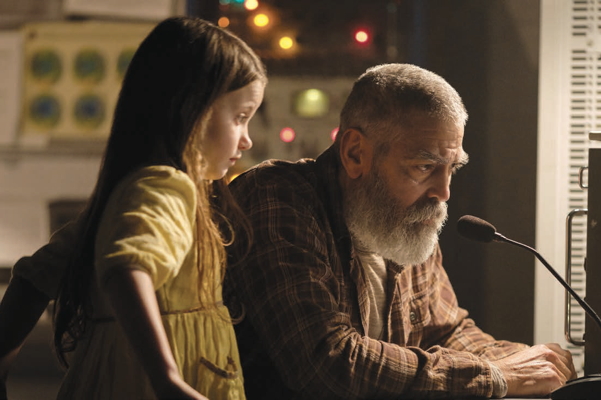
‘The Midnight Sky’ dramatizes catastrophic 2049 circumstances
By Diane Carson
Two storylines compete for attention in director George Clooney’s sci-fi film “The Midnight Sky.” The central plotline begins with onscreen titles: Arctic Circle, 2049, three weeks after what is called the Event. That means Earth is now uninhabitable from an unspecified cause. However, the astronomer scientist Augustine Lofthouse and eight-year-old stowaway Iris survive in an Arctic research station.
When radar malfunctions, Augustine and Iris head out on a snow mobile for a nearby outpost with a better antenna. That trip will become a struggle to survive, a plot development echoing events in a parallel subplot. In it, five explorers are returning home on their spacecraft Aether after two years assessing possible colonization of K-23, Jupiter’s previously undiscovered moon. They too will face crises from meteor showers bombarding Aether and during a spacewalk repair job.
George Clooney, who plays Augustine, Iris (largely mute), and the astronauts (three men, two women) affect a calm, subdued manner, which doesn’t enhance viewer involvement. That requires connecting with the yearning, regrets, and interior lives of the characters. And while a few action sequences occur, even they are restrained by today’s standards. Therefore, appeal relies on what Clooney calls the “real need to connect, deeply connect.” That defines Augustine’s interaction with Iris and also dominates the astronauts’ decisions once they contact Earth and learn of its demise. Augustine suffers from what we assume is radioactive fallout, requiring daily blood transfusions, again none of the details explained. Viewers own longing and emotional distress, perhaps at its height for many right now, governs the success of “The Midnight Sky.”
Screenwriter Mark L. Smith’s adaptation of Lily Brooks-Dalton’s novel “Good Morning, Midnight” offers sparse dialogue, a great deal communicated through glances or delayed reactions. The production design for the Aether spaceship versus the Earth’s habitats sets up a strong, vivid contrast with the somewhat recognizable world here opposed to the futuristic technology, including family videos called up and reexperienced. The acting is first-rate: Clooney, Felicity Jones, David Oyelowo, Kyle Chandler, Demián Bechir, Tiffany Boone, and Caoilinn Springall as Iris.
However, the cross-cutting between the two stories is inelegant, and attempts at profundity feel too simplistic, a reminder of the universal need to connect which may resonate now but that doesn’t take two slow hours to establish. “The Midnight Sky” streams on Netflix.


